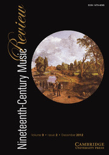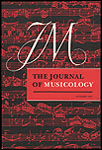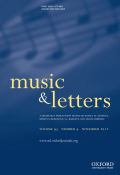
BACH
Scope & Guideline
Celebrating the Master: Unraveling the Threads of Bach's Genius
Introduction
Aims and Scopes
- Interdisciplinary Musicology:
BACH emphasizes the intersection of musicology with other disciplines such as theology, dance, and cultural studies, encouraging a multifaceted approach to understanding Bach's music. - Performance Practice and Interpretation:
The journal frequently publishes studies on performance practices, offering insights into how Bach's compositions can be interpreted and presented in various contexts, including modern adaptations and historical performance. - Historical Contextualization:
Research often situates Bach's works within their historical milieu, examining influences from contemporaneous composers and the sociocultural factors that shaped musical life during Bach's time. - Theological and Philosophical Inquiry:
BACH explores the theological and philosophical implications of Bach's music, reflecting on its spiritual dimensions and the broader questions of existence and artistry. - Analysis and Theoretical Perspectives:
The journal includes analytical studies that apply various theoretical frameworks to Bach's compositions, contributing to a deeper understanding of his musical language and structures.
Trending and Emerging
- Choreography and Dance Interpretations:
Recent publications highlight an increasing interest in the relationship between Bach's music and choreography, showcasing how his works inspire contemporary dance interpretations and performances. - Cultural Reception Studies:
There is a growing trend in analyzing the reception of Bach's music in various cultural contexts, particularly in Britain during the 18th and 19th centuries, indicating a broader interest in historical reception and its implications. - Interdisciplinary Collaborations:
The journal is witnessing an uptick in collaborative studies that bridge musicology with other fields such as visual arts and literature, fostering a more holistic understanding of Bach's impact across disciplines. - Theological and Philosophical Dimensions:
Emerging themes increasingly delve into the theological and philosophical implications of Bach's compositions, reflecting a resurgence of interest in the spiritual and existential questions raised by his music. - Modern Technological Perspectives:
There is a notable rise in the application of modern analytical techniques, such as information theory and statistics, to explore Bach's music, indicating a trend towards integrating technology in musicological research.
Declining or Waning
- Focus on Early Music Performance:
There has been a noticeable decrease in papers dedicated solely to early music performance practices, as the journal increasingly incorporates broader interdisciplinary perspectives. - Limited Exploration of Non-Western Influences:
The journal has published fewer articles examining non-Western musical influences on Bach, suggesting a narrowing of focus that may overlook the global context of his work. - Decreased Emphasis on Biographical Studies:
Recent issues show a waning interest in biographical studies of Bach and his contemporaries, as the journal shifts towards thematic and analytical explorations rather than individual composer narratives.
Similar Journals

Nineteenth-Century Music Review
Advancing Scholarship in Music's Transformative EraNineteenth-Century Music Review, published by CAMBRIDGE UNIVERSITY PRESS, is an essential scholarly journal in the field of musicology, particularly focusing on the vibrant and transformative period of the nineteenth century. This journal, archived under ISSN 1479-4098 and E-ISSN 2044-8414, serves as an invaluable platform for researchers, professionals, and students alike who are dedicated to exploring the multifaceted interactions between music and society during a time of significant cultural change. With its commitment to high-quality research and critical discourse, it embraces a diverse range of topics, including historical analysis, performance practice, and socio-cultural contexts within music. Operating from the United Kingdom, Nineteenth-Century Music Review is currently categorized in the fourth quartile of music journals according to Scopus rankings, offering a unique opportunity for emerging scholars to contribute to the expanding dialogue in this niche while also reaching a broad audience within the arts and humanities. Although the journal follows a traditional subscription-based model, it continues to be a pivotal resource for academic inquiry and knowledge dissemination in the landscape of nineteenth-century music history.

Musica Oral del Sur
Exploring the Heartbeat of Southern Music TraditionsMusica Oral del Sur is a prominent academic journal published by the Junta Andalucía through the Centro Documentación Musical Andalucía. With its ISSN 1138-8579 and E-ISSN 2445-0391, this pioneering publication has championed open access since 1995, providing a vital platform for scholars dedicated to the exploration of traditional and contemporary oral music practices in Southern Spain and beyond. The journal is essential for researchers, professionals, and students interested in musicology, ethnomusicology, and cultural studies, promoting scholarly discourse through a rich assortment of articles, reviews, and field research. Set in the vibrant cultural landscape of Granada, the journal encourages the fusion of theoretical insights with practical implications, making significant contributions to the understanding of oral musical traditions. By fostering accessible academic dialogue, Musica Oral del Sur plays an invaluable role in preserving and highlighting the heritage of Southern musical expressions while addressing contemporary issues in the field.

JOURNAL OF MUSICOLOGY
Exploring the Depths of Musical ScholarshipJOURNAL OF MUSICOLOGY, published by UNIV CALIFORNIA PRESS, stands as a premier academic forum for the exploration and dissemination of research in the field of musicology. With an ISSN of 0277-9269, this journal provides a vital platform for scholars, practitioners, and educators to engage with contemporary and historical music studies. The journal, which has been publishing significant works since 1982 and continues through to 2024, boasts a commendable Q2 ranking in Music and holds a notable position within the 68th percentile of Scopus rankings for Arts and Humanities, specifically in Music. Although it does not offer open access, the journal remains a crucial resource for those dedicated to advancing the understanding of musical heritage, theory, and practice. The JOURNAL OF MUSICOLOGY aims to foster interdisciplinary dialogue and promote innovative methodologies within the field, thereby making it an essential read for all engaged in the scholarly pursuit of music.

Musicologica Brunensia
Empowering Scholars in the World of MusicologyMusicologica Brunensia, an esteemed journal published by Masaryk University, Faculty of Arts, serves as a significant platform for the dissemination of knowledge in the field of musicology. Based in the Czech Republic, this Open Access journal has been facilitating scholarly communication since 2009, allowing unrestricted access to its rich array of research articles. With an ISSN of 1212-0391 and an E-ISSN of 2336-436X, Musicologica Brunensia proudly holds a Q3 ranking in the Music category as of 2023, reflecting its dedication to advancing research in the arts and humanities, particularly music. The journal accepts contributions spanning diverse topics within music studies, fostering interdisciplinary dialogue among researchers, professionals, and students alike. Located at Arne Novaka 1, Brno, 60200, Czech Republic, Musicologica Brunensia is poised to continue its journey of promoting innovative scholarship in musicology until 2024 and beyond, making it a valuable resource for anyone passionate about the field.

Oido Pensante
Elevating Music Studies Through Open Access ScholarshipOido Pensante is a prominent open-access journal dedicated to the multifaceted field of music, published by the esteemed University of Buenos Aires, specifically through its Faculty of Philosophy and Letters, Institute of Anthropological Sciences. Since its inception in 2013, this journal has fostered a rich platform for scholarly discourse and innovative research at the intersection of music and cultural studies. With an ISSN of 2250-7116, Oido Pensante aims to bridge theoretical frameworks and practical applications, making significant contributions to the understanding of music in its social context. Currently, it holds an impressive Q3 ranking in the Arts and Humanities – Music category for 2023, with a Scopus rank of #99 out of 180 journals, reflecting its commitment to academic rigor and relevance. The journal's open access policy ensures that research is widely disseminated and accessible, making it an invaluable resource for researchers, professionals, and students alike in Argentina and beyond. With converged years from 2017 to 2024, Oido Pensante continues to expand its reach, encouraging intellectual exchange and stimulating dialogue within the music community.

Vestnik Sankt-Peterburgskogo Universiteta-Iskusstvovedenie
Illuminating Emerging Research in the ArtsVestnik Sankt-Peterburgskogo Universiteta-Iskusstvovedenie, published by ST PETERSBURG UNIV PRESS, is a distinguished academic journal based in the Russian Federation, focusing on the interconnected disciplines of Conservation, History, Music, and Visual Arts and Performing Arts. With an ISSN of 2221-3007 and E-ISSN of 2542-2243, this journal plays a vital role in disseminating scholarly research and fostering dialogue across these fields. Despite being categorized in the third quartile (Q3) in 2023 across its respective disciplines, its significance lies in publishing emerging research and critical analyses that contribute to the academic discourse. The journal accepts submissions until the converged years spanning 2016 to 2024, making it a relevant platform for current academic inquiry. Although it currently does not offer open access, the journal provides robust insights for researchers, professionals, and students eager to explore the nuances of cultural heritage and artistic expression. As it continues to develop its impact within the arts and humanities, Vestnik Sankt-Peterburgskogo Universiteta-Iskusstvovedenie remains an essential resource for those passionate about understanding and preserving the rich tapestry of artistic endeavors.

MUSIC & LETTERS
Illuminating the Intersections of Culture and CompositionMUSIC & LETTERS, published by Oxford University Press, is a prominent academic journal that has been at the forefront of musicology and music studies since its inception in 1920. With an ISSN of 0027-4224 and an E-ISSN of 1477-4631, the journal provides a platform for scholarly articles that explore the rich interplay between music and literature, contributing significantly to the understanding of musical context, form, and societal impact. As of 2023, it holds a respectable Q3 rank in Music within its category, positioned at Rank #66 out of 180 in the Scopus Arts and Humanities Music category. Despite not being an Open Access journal, its rigorous peer-review process and commitment to high-quality research make it an essential resource for researchers, professionals, and students alike. The journal's scope encompasses various genres and historical periods, ensuring a comprehensive examination of music's role in culture and community, thereby enhancing the scholarly discourse within this vibrant field. Based in the United Kingdom, at Great Clarendon St, Oxford OX2 6DP, England, MUSIC & LETTERS continues to inspire and inform the global music scholarly community.

FONTES ARTIS MUSICAE
Contributing to a rich legacy of music scholarship.FONTES ARTIS MUSICAE, with ISSN 0015-6191 and E-ISSN 2471-156X, is a distinguished journal published by A-R EDITIONS, specializing in the fields of Music and Library and Information Sciences. Established in the United States, this journal serves as a vital resource for scholars, practitioners, and students engaged in the exploration and analysis of music and its associated disciplines. With an established converged publication history from 2002 to 2024, FONTES ARTIS MUSICAE has consistently contributed to the discourse within its scope, reflected in its current quartile rankings of Q4 in Library and Information Sciences and Q3 in Music for 2023. Although not an open-access journal, it offers essential insights and research findings, appealing to a diverse academic audience. Its position within the 18th percentile of the Arts and Humanities (Music) category and 11th percentile in Library and Information Sciences underscores its growing significance in these fields, making it a critical platform for advancing knowledge and fostering collaboration.

RIVISTA ITALIANA DI MUSICOLOGIA
Advancing Scholarly Discourse in MusicologyRIVISTA ITALIANA DI MUSICOLOGIA, published by the Italian Society of Musicology, is a distinguished journal dedicated to the field of musicology, offering a platform for scholarly research and discourse on a wide array of musical topics. With an ISSN of 0035-6867 and an E-ISSN of 2036-5586, this journal has contributed significantly to the understanding of music in cultural and historical contexts. Although the scope of coverage was marked from 2003 to 2008 in renowned databases like Scopus, the journal continues to serve as an invaluable resource for researchers, educators, and students embroiled in music studies. Its emphasis on rigorous research and critical analysis makes it a vital asset for anyone seeking to deepen their knowledge of musicological inquiry. While not an open-access publication, the RIVISTA ITALIANA DI MUSICOLOGIA remains a prestigious outlet for scholarly contributions that reach audiences eager to explore the complexities of musical heritage.

Studi Musicali-Nuova Serie
Exploring the Depths of MusicologyStudi Musicali-Nuova Serie is a distinguished academic journal dedicated to the field of musicology, published by the esteemed ACCAD NAZ SANTA CECILIA, FONDAZIONE. This journal serves as a platform for the dissemination of cutting-edge research and scholarly discourse surrounding various aspects of music, including historical, theoretical, and applied music studies. While the journal has contributed significantly to the field with its publication span from 2002 to 2009, it has since been recognized for its rigorous academic standards and its role in advancing knowledge in musicology. Despite its coverage being discontinued in Scopus, it continues to hold relevance among researchers, professionals, and students interested in the rich and diverse world of music. Situated in the heart of Rome, at the AUDITORIUM PARCO DELLA MUSICA, this journal embodies the vibrant cultural heritage of Italy while fostering international academic collaboration in music studies.